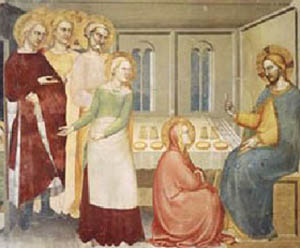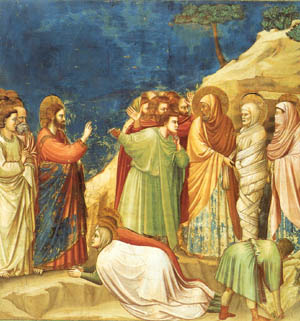 |
Commentaries on Saints
St. Martha – July 29
Fr. Paul Sretenovic
Today, July 29, is the Feast of St. Martha, sister of St. Mary Magdalene and St. Lazarus. We find her in the Scriptures three times, twice directly and once indirectly.

Mary and Martha in the House of Bethany
Giovanni da Milano
|
In the first instance, Martha questions Jesus about her sister, who was sitting listening at the Lord’s feet while Martha was busy preparing the meal in the Gospel of St. Luke:
“Martha was busy about much serving. She stood and said: ‘Lord hast thou no care that my sister hath left me alone to serve? Speak to her therefore, that she help me.’
“And the Lord answering, said to her: ‘Martha, Martha, thou art careful and art troubled about many things. But one thing is necessary. Mary has chosen the best part, which shall not be taken away from her’” (10:40-42).
We also find her questioning Jesus about the death of her brother, Lazarus, in St. John's Gospel, where she comes to a deeper faith in the divinity of Christ, much like the example of the Samaritan woman (John 4:15).
“Martha, therefore, as soon as she heard that Jesus had come, went to meet him, but Mary sat at home. Martha therefore said to Jesus: ‘Lord, if thou had been here, my brother would not have died. But now also I know that whatsoever thou wilt ask of God, God will give it to thee.’
“Jesus said to her: ‘Thy brother shall rise again.’ "Martha said to him: ‘I know that he shall rise again, in the resurrection at the last day.’
“Jesus said to her: ‘I am the resurrection and the life. He that believes in me, although he be dead, shall live. And everyone that lives and believes in me shall not die forever. Believest thou this?’
“She said to him: ‘Yea, Lord I have believed that thou art Christ the Son of the living God, who art come into this world’” (11:20-27).
The third instance is a reference to Jesus, shortly before the Holy Week, when Our Lord had supper at the house of Lazarus along with Martha and Mary (John 12:1-2). He then stayed as their guest there that night.
“Jesus, therefore, six days before the pasch, came to Bethany, where Lazarus had been dead, whom Jesus raised to life. And they made him a supper there, and Martha served. And Lazarus was one of them that were at table with Him.”
From there, Our Lord would leave to enter triumphant into Jerusalem on Palm Sunday. That blessed family would, therefore, provide a place for Our Lord to rest His head a short while before the most solemn week in the History of mankind.
In her three reported encounters with Jesus, St. Martha represented the Three Ways of the Interior Life, as taught by theologians such as Fr. Garrigou-Lagrange, a famous French theologian of the time of Pius XII.
The Purgative Way is represented in the first encounter, when Martha's soul is purified of her attachment to her own will by coming to recognize that "one thing necessary," doing the will of God.
The Illuminative Way is symbolized when Jesus reveals Himself to Martha before He raises Lazarus from the dead: “I am the resurrection and the life. He that believes in me, although he be dead, shall live. And everyone that lives and believes in me shall not die forever.”
The Unitive Way is represented when Jesus stays in the home of His three friends. Not only does Our Lord physically reside in Martha's home, but because she has been previously instructed, He finds in her soul a fit dwelling place through her contemplation of His presence. It is by doing God's will and receiving the illumination that comes after fidelity to that Will that we are thus prepared for a similar gift to the one that St. Martha symbolized.

The Raising of Lazarus by Giotto
|
Alas, many people never get beyond the first stage in the interior life. This does not mean that such people lose their souls, but rather, as Garrigou-Lagrange points out in his masterpiece, Life Everlasting, persons like these will see in Purgatory the higher place they would have had in Heaven had they been willing to cooperate with the grace that God was offering to them to make further progress. Indeed, they will suffer acutely from this realization.
Whereas St. Martha made a profound act of humility in accepting Jesus' gentle rebuke in Luke's Gospel, we often do the unthinkable act of questioning Our Lord's wisdom or convincing ourselves that it is not the voice of God speaking to our souls after all when His answer is different from what we want to hear. Imagine if after Jesus had told Martha that "only one thing is necessary," she had turned around and walked away sad, like the rich man who had many possessions.
Every soul that is serious about following Our Lord will be visited by Him to test the purity of his or her intentions. It is then that the soul makes its choice either for God or for self. It is precisely in Martha's humility that we find her ascent to the first step of sanctity, because it is clear that there was a resistance in her natural dispositions to embrace the will of God, and she needed to purge it.
Like St. Martha, we should have the humility to face our own defects and then fight against them. Afterwards, Our Lord will illuminate our souls showing the way He chose for us to follow, and then, we will start to be one with Him, that is, united with Him. This mystical union is a pre-taste of the eternal happiness we will have in Heaven where He will be “our reward exceedingly great.”

|
Saint of the Day | Home | Books | CDs | Search | Contact Us | Donate

© 2002- Tradition in Action, Inc. All Rights Reserved
|
 |

|